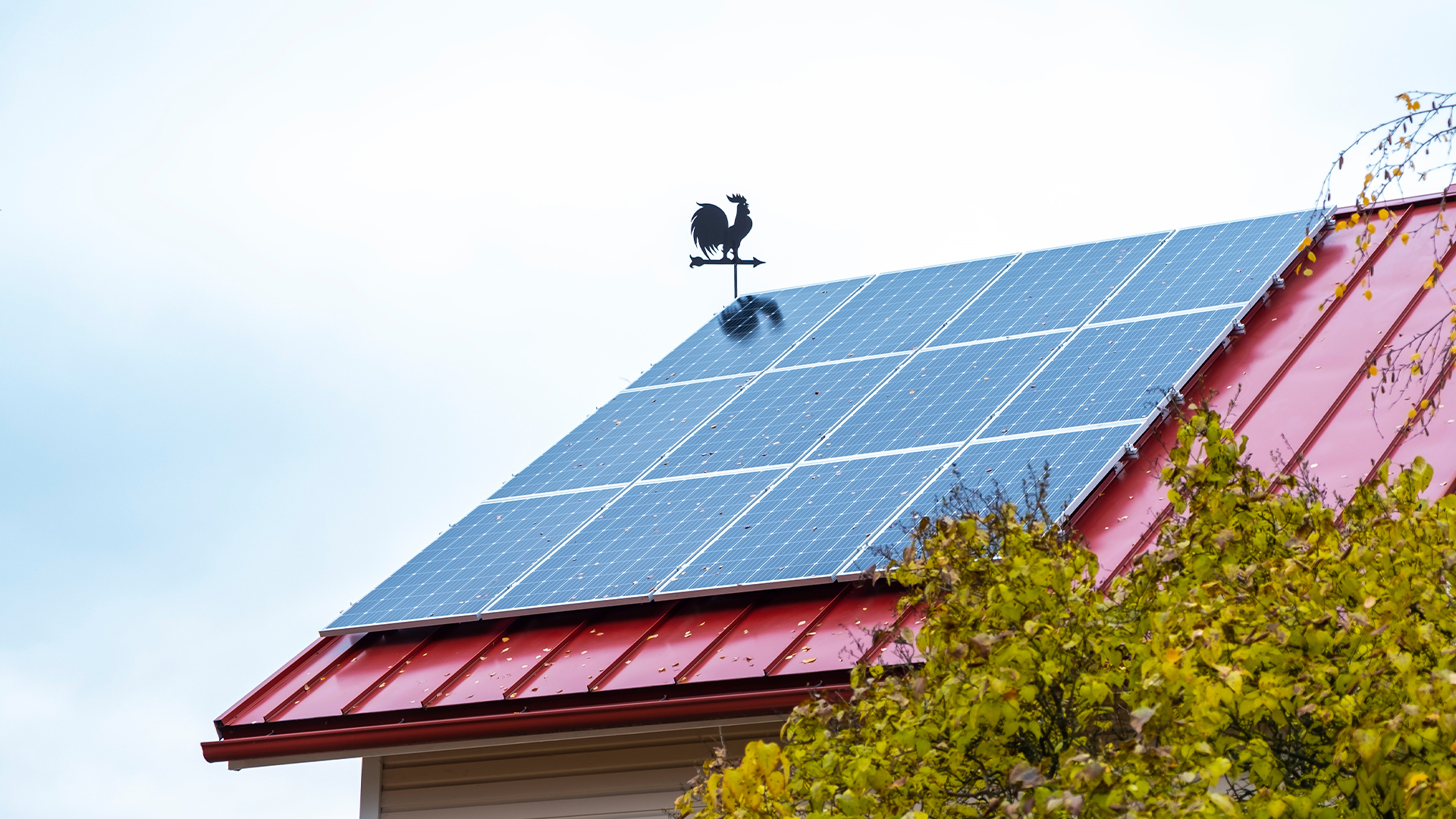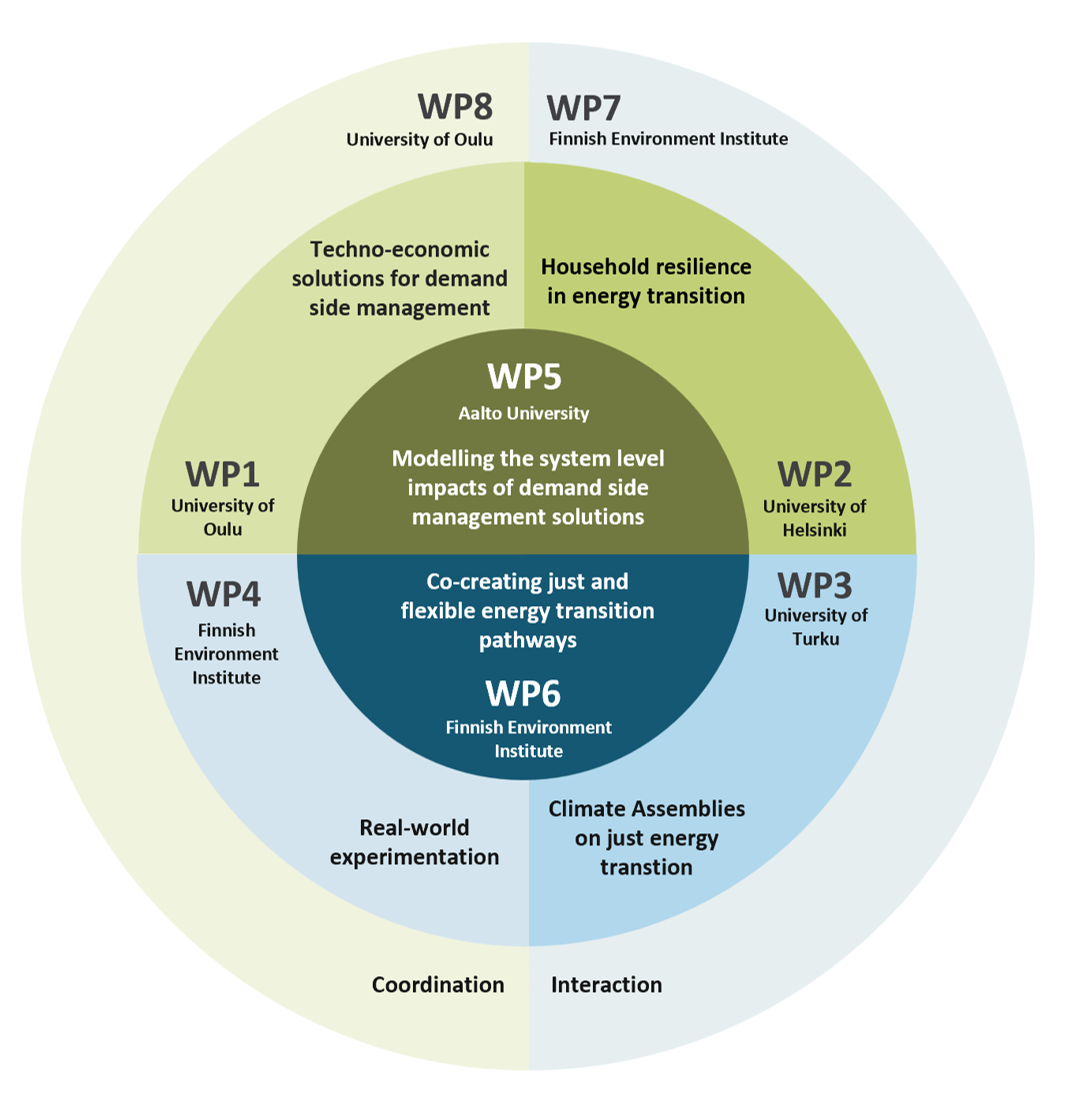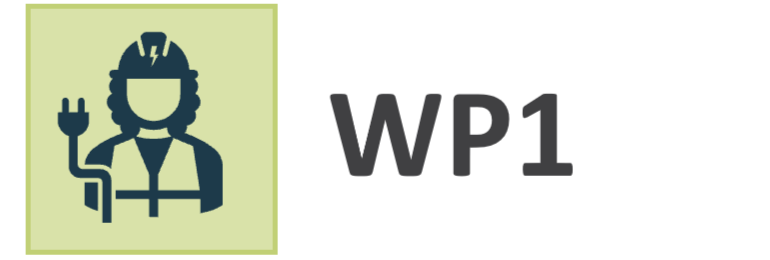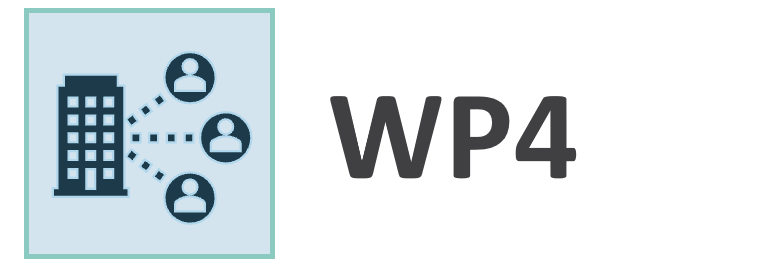
Project participants
Tämän konsortiohankkeen osapuolia ovat:
- University of Oulu
- Finnish Environment Institute
- University of Helsinki
- University of Turku
- Aalto University

Work packages and responsible parties

WP1. Techno-economic solutions for demand side management (University of Oulu)
WP2. Household resilience in energy transition (University of Helsinki)
WP3. Climate Assemblies on just energy transition (University of Turku)
WP4. Real-world experimentation (Finnish Environment Institute)
WP5. Modelling the system level impacts of demand side management solutions (Aalto University)
WP6. Co-creating just and flexible energy transition pathways (Finnish Environment Institute)

Techno-economic solutions for demand side management
WP1 provides technical and market solutions for demand side management (DSM) in households. We assess and review DSM technologies and services currently available on the market. Working together with Motiva, we aim to develop an information page for consumers to help decide which solution fits better for their household. Most of these solutions aim to optimize electricity expenditures.
Show moreIn addition, we also want to raise awareness of the environmental impacts of electricity production and use. To this end, we will develop algorithms to provide predictions for the environmental metrics of electricity. The project will then build an open access platform to communicate these predictions, to help consumers to make environmentally conscious decisions on how to optimize their energy usage. The efficacy of this information-based smart energy management tool will be tested in several trials in collaboration with WP4.
Show less
Household resilience in energy transition
WP2 focuses on the question of how and under which conditions can DSM solutions increase the resilience of individual households and strengthen active energy citizenship in a fair and just manner. In this subproject, we investigate services in DSM offered to households to increase understanding of the social, economic, and political factors that enable or hinder the adoption and mainstreaming of DSM in a just manner.
Show moreWe identify factors of energy vulnerability to understand issues contributing to household resilience and what constitutes a risk of a household becoming energy-vulnerable or poor.
An important part of the work is to map out residents’ potential for adopting DSM solutions embedded in energy-related household practices and examine conditions for various solutions considering energy-vulnerable households to draft initial guidelines for fair service options. In addition, we evaluate the findings of the Flaire project and produce a conceptual model and indicators to assess household resilience in energy transition.
Show less
Climate Assemblies on just energy transition
WP3 will design, organize, and examine Citizens’ Assemblies (CAs) to facilitate just energy transitions. The focus of CAs is on sustainable dwelling practices, which make use of demand response and energy conservation. The aim is to develop innovative models for citizen deliberation on energy issues, which involve interaction with experts and reflection on participants’ own experiences.
Show moreThe CAs are organised in collaboration with relevant ministries and local authorities and they feed into policy processes.
WP3 will also implement randomized survey experiments to gauge whether the effects of a CA can be ‘scaled up’ and whether CAs can be used as trusted sources of information on energy for a wider public. At the same time, we can analyze citizens’ trust in different sources of energy-related information more generally.
Show less
Kulutusjousto ratkaisujen kokeilut
In WP 4, real-life experiments are conducted on implementing demand response across various areas of society and among different stakeholder groups. The experiments examine the informational and technical capabilities of different user groups, such as consumer citizens, municipalities, and energy companies, to implement demand response in various ways. They also aim to identify the impacts of different demand response implementation methods from both environmental and economic perspectives.
Show moreThe WP4 experiments targeted at consumer citizens investigate the functionality of automation systems and informational guidance, particularly from the viewpoint of vulnerable groups. The experiments involving municipalities and energy companies generate new knowledge on demand response at the energy system level. Overall, the evaluations aim towards a clearer understanding of how to best promote demand response — and conversely, when demand response is not a desirable solution.
Show less
Modelling the system level impacts of demand side management solutions
WP5 uses and develops energy system models to analyze how demand side management (DSM) solutions could contribute to reaching national climate targets. The modelling will also be used in WP6, to help in co-creating transition pathways with stakeholders.
Show moreWP5 uses and develops energy system models to analyze how demand side management (DSM) solutions could contribute to reaching national climate targets. The modelling will also be used in WP6, to help in co-creating transition pathways with stakeholders.
Show less
Co-creating just and flexible energy transition pathways
WP6 will apply transition arena methodology to co-create pathways for accelerating and mainstreaming DSM solutions as part of the Finnish energy system. Transition arena is a structured and facilitated space for a diverse group of change agents and key policy actors to critically reflect on current socio-technical systems, like energy systems, develop shared visions, and define strategic steps for achieving this vision by outlining specific actions and policy measures.
Show moreWe will build on our previous experiences in energy transition arenas as a collaborative learning process and develop the methodology further by adding an explicit knowledge co-creation element to the process.
Designing effective DSM solutions requires transdisciplinary work that brings together expertise in smart home technology, energy markets, new business models, and relevant regulatory frameworks as well as an understanding of the potential and possibilities of households to adopt and make use of DSM solutions.
Show less